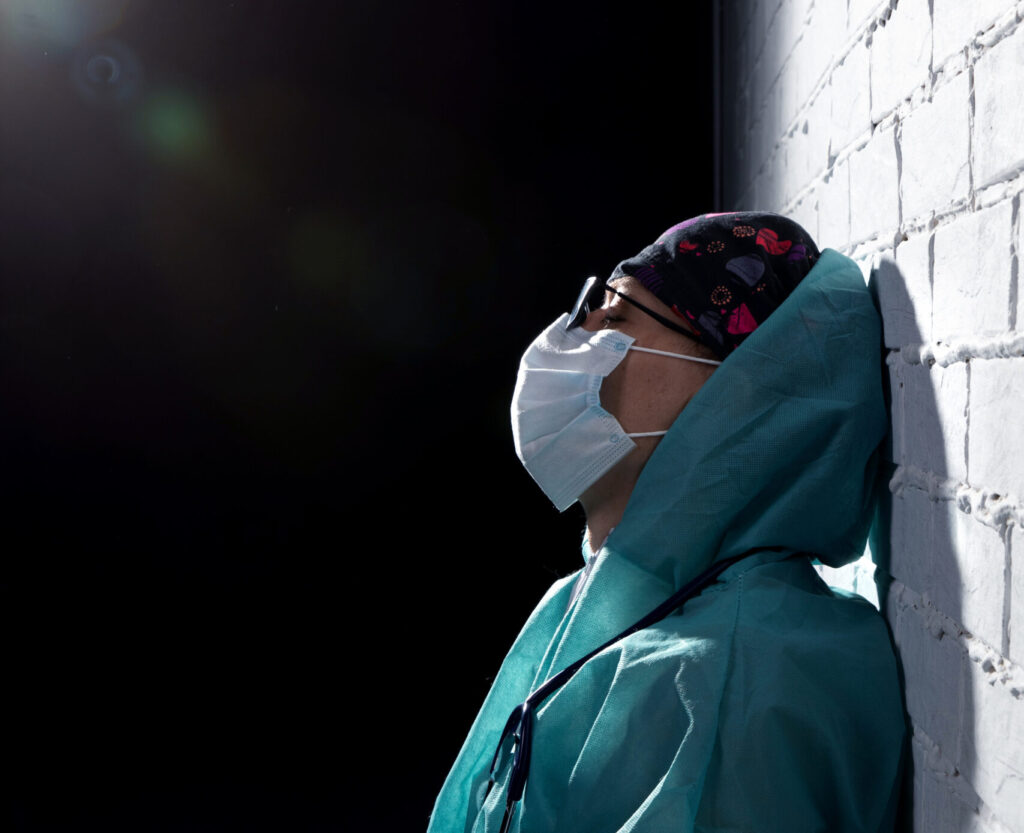
I am writing this knowing that I am not alone in calling for mental health support for both residents in aged-care settings, and those of us who work there. I have been a health-care worker for more than 30 years now, and never imagined how much our lives would be turned upside down by this pandemic.
In the first lockdown, in March 2020, a skeleton staff felt abandoned, scared and unsure of what to do. We walked around, tearful, yet still doing our jobs to the best of our ability as we ran low on personal protective equipment (PPE) and sanitiser. We had to do the job of undertakers, who were not permitted inside. We learned how to place a body in a body bag, the correct way to wheel a gurney out the door — even how to place a body in the back of a hearse. All this has been a steep learning curve.
Lockdown after lockdown, red zones, a carousel of staff and patients testing positive, constant use of surgical masks, N95s and sanitiser, meals served in residents’ rooms, isolation and restricted movements, appointment slots for visitors, distancing. It’s all very overwhelming at times.
Staff have been pushed to exhaustion, both registered nurses (RNs) and health-care assistants (HCAs) doing 12-hour shifts at times.
We have become so much more than staff to our beloved residents, during these very tough times. And we are also mums, dads, partners, daughters/sons and grandchildren/parents ourselves.
I still have a vivid memory of walking past a man’s room, seeing he was taking his last few precious breaths, and walking in to hold his hand, and him looking at me with the most grateful eyes.
Our residents are finding it so tough adjusting to this very new way of living. I hear so often their thoughts of wanting to just give up — “What’s the point? I can’t even see my family,” they say. Spouses wave to each other and blow kisses through the glass doors.
The saddest thing is asking residents, if they had the choice, would they risk catching COVID and seeing their families, or stay away? Every single resident said they would rather take the risk. Giving up seems to become more of an option when they have to fight on their own, with only phone and video calls, when isolation feels like never-ending torture — for goodness knows how long till one lockdown ends and another begins.
Under lockdown, residents cannot attend medical appointments, unless absolutely paramount. Nor can they enjoy simple pleasures such as getting a hair cut. Every tradie has to take a RAT (rapid antigen test) and PPE-up — so do the families of palliative care residents, who must also restrict their visiting times for the safety of others.
Staff who are symptomatic must get the PCR (nasal swab) test from RNs, effectively putting those RNs at risk every time. We have to begin shifts earlier to allow time to RAT test — testing outside in the dark and cold before we can begin a shift!
I was also asked in a previous workplace to choose between coming to work or having my children. Of course, being a solo parent I had to choose work, as I was not aware of any alternative at this time and who else was going to pay the rent? If there was one, I was certainly not aware. So I gave my children up to their Dad for what felt like the hardest time I have endured to date.
We have to begin shifts earlier to allow time to RAT test — testing outside in the dark and cold before we can begin a shift!
I still have a vivid memory of walking past a man’s room, seeing he was taking his last few precious breaths, and walking in to hold his hand, while he looked at me with the most grateful eyes. A reminder of total lockdown — yet another loved father/grandfather/uncle/brother feeling totally alone in these unusual times. I’m just glad I happened to be walking past.
Other people don’t realise that those of us who work in an aged-care facility not only have to think about work but whom we associate with out of work — where we go and what we do. Our residents’ lives really are in our hands.
Lately, residents say they feel safe in their bubble despite feeling alone. Knowing that we test daily helps them feel safe, as well as giving us caregivers peace of mind that we are not bringing COVID into their home.
Written with love, by a tired but passionate health-care assistant.
* The name of the author has been withheld by agreement with the co-editors.


